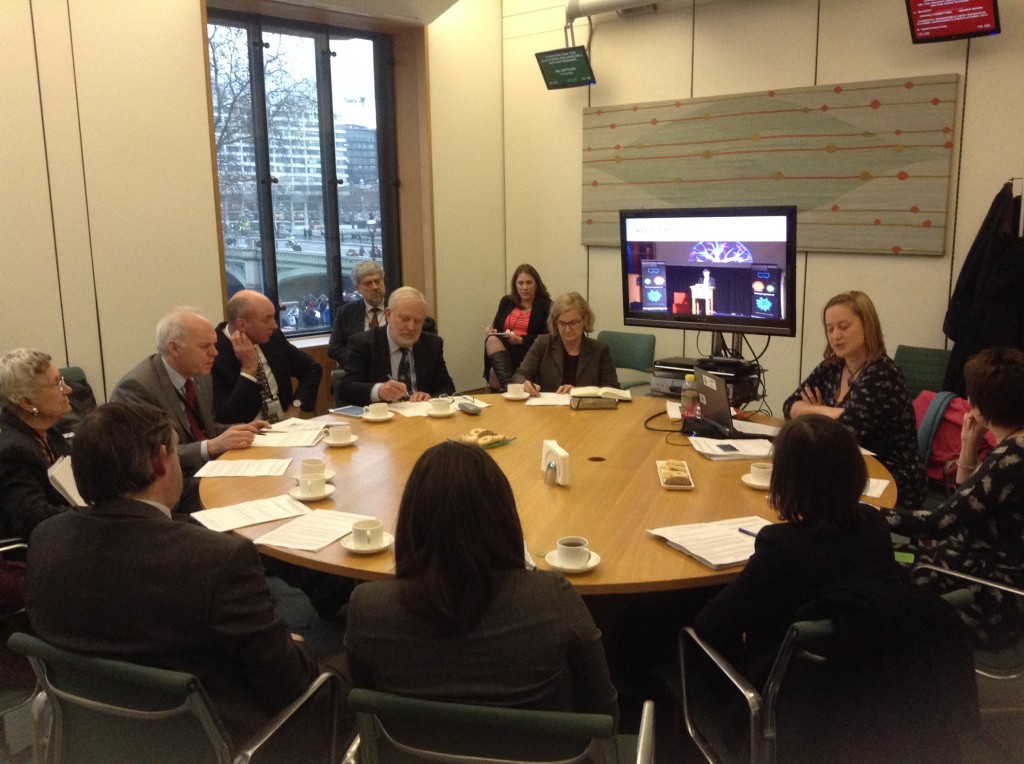
Speakers Andrew Miller MP, Amanda Spielman, Chair of Ofqual, and Katherine Mathieson of the British Science Association were joined by Nick Dakin MP, Baroness Howe and a range of stakeholders for a round table discussion of science education provision.
On 27 January 2015 the APPG for Education was delighted to host a meeting on the question of whether science provision in schools equips our young people for the workplace. The Group was addressed by Andrew Miller MP, Chair of the Commons Science and Technology Select Committee, Amanda Spielman, Chair of Ofqual, and Katherine Mathieson, Director of Programmes at the British Science Association.
Nic Dakin welcomed everyone to the meeting and introduced the speakers.
Katherine Mathieson (KM) talked about science being at the heart of British culture and learning. The work of the British Science Association (BSA) was introduced, including the organisation of British Science Week and the CREST Awards, for example.
She talked about how not enough was being done to encourage the take up of STEM subjects and how the BSA allowed students to gain an insight into subjects not otherwise available to them. The 21st Century science curriculum should encourage pupils to continue science subjects to A Level, not just to GCSE.
Part of the problem is the very early specialisation in the UK Education system in which science needs to be seen as a more basic fundamental to education. David Willetts MP has stated that there is concern that employers are looking for a better mix of skills and this is being stifled by narrowing of subject choices. Scotland for example allows for a greater focus on creativity through the Curriculum for Excellence and taking 5 Highers.
The challenge for Science departments was over-coming the assumption that science is just for scientists. KM stressed the importance of practical work in making the subjects interesting and attractive. In 2011 over half of state schools had no girls taking Science A Level.
Dominic Savage asked if teaching science was expensive and therefore an inhibitor. KM stated that she was not best placed to answer that but having taken the CREST awards with grants into less well-off schools the opportunity was not taken up widely. She thought it was about confidence in the subject. Nic Dakin stated that as an English teacher, he always saw the relevance of science across teaching.
Andrew Miller (AM) believes there is a necessity to engage more effectively with students to encourage science take-up. The Royal Society of Chemistry is gathering information on primary school teachers’ qualifications – he believes at best 12% have a science degree. Initial teacher training has some rather off-putting sections. Additionally the importance of classroom practicals was emphasised again; without them the students might as well be watching experiments on television.
The Commons Science and Technology Committee held an evidence session on Ofqual’s proposals. It is the Committee’s view that the current proposals would not have the excitement built into practical experiments and that alternatives need to be considered. Click here for evidence and further information on this inquiry.
Amanda Spielman agreed with both KM and AM. She believes the new science qualifications will give a more holistic approach to science learning and that practical science will have a role to play. The new curriculum will allow teachers to think about what they are teaching and what is required to progress to the next stage. However, she believes that schools have to take responsibility to ensure that competencies are reached by pupils and this is partly through practicals. The roundtable events held did not bring any new ideas to the table.
Baroness Howe asked if things were different in academies. Andrew Miller said that a wide number of employers stated that students did not have practical skills and schools were not going beyond the structures currently in place to teach such skills.
Other points raised were:
- This presents an opportunity to re-focus practical learning and deepen students’ knowledge
- There is a need for joined-up thinking between Ofqual/Ofsted/DfE and Awarding bodies to help teachers, as messages differ from body to body
- It is vital to get more STEM teachers into primary school teaching
- It was recommended that those present looked at the following video: http://www.ocr.org.uk/qualifications/by-subject/science/positive-about-practical/
